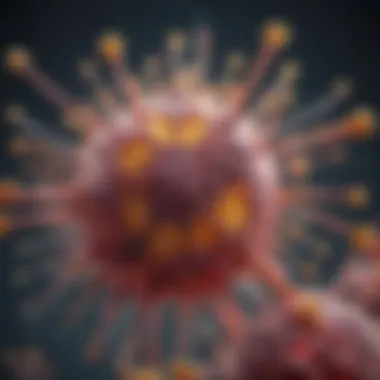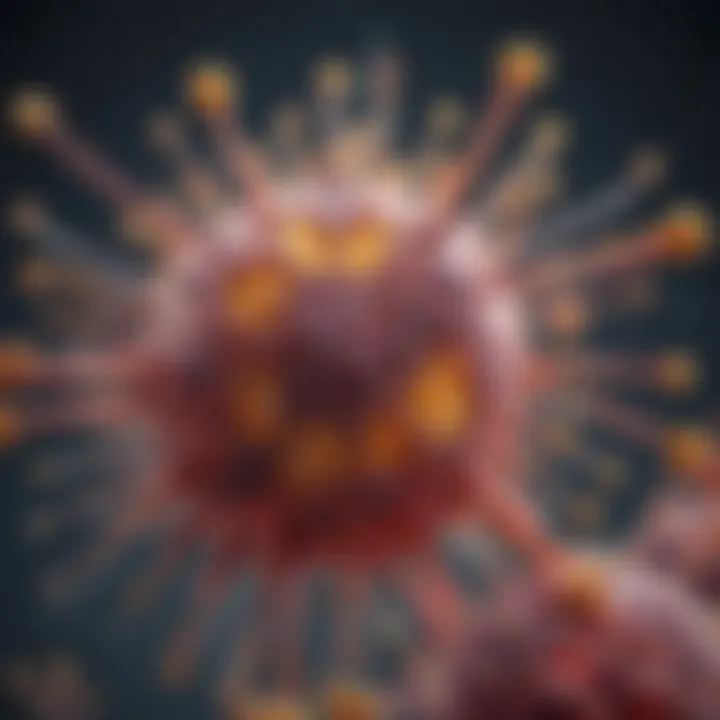Understanding Immune System Failures and Solutions


Intro
The immune system acts as the body’s defense mechanism, vital in identifying and neutralizing threats such as pathogens. However, when it starts to fail, the implications can be severe, leading to increased susceptibility to infections and other health issues. Understanding the complexities surrounding a failing immune system involves delving into various elements, such as underlying causes, lifestyle impacts, and current treatment options. This discussion aims to illuminate these facets while also challenging common misconceptions and enriching the reader's grasp of immune health.
Methodology
Study Design
The present piece explores a multifactorial approach to understanding immune system failures, drawing from various scientific literature, observational studies, and expert opinions. The intent is to construct a well-rounded picture of the immune dysfunction landscape.
Data Collection Techniques
Data was collected from peer-reviewed journals, articles focused on immunology, and available research from databases like PubMed and Google Scholar. Sources also included reputable websites such as the World Health Organization and relevant health organizations ensuring a broad and reliable framework.
Factors Contributing to Immune System Failure
Numerous factors can contribute to the deterioration of immune function, categorized into genetic, lifestyle, and environmental influences.
- Genetic Predisposition: Some individuals may inherit genes that impact immune response. For instance, certain polymorphisms can affect cytokine production.
- Lifestyle Choices: Diet, exercise, and sleep play crucial roles. Poor nutrition can result in deficiencies that compromise immune defenses. Additionally, chronic stress affects the immune system negatively.
- Environmental Influences: Exposure to pollutants or continuous infections can lead to immune exhaustion, making it essential to consider one's living conditions.
Early Signs of Immune Dysfunction
Recognizing the early signs of a failing immune system is vital for timely intervention. Some common indicators include:
- Frequent Illnesses: Individuals might notice an uptick in minor infections or prolonged illnesses.
- Fatigue: Unexplained tiredness can signal underlying immune issues.
- Slow Healing: Wounds may take longer than usual to heal, suggesting insufficient immune support.
It is important to listen to your body as early intervention can be key to managing immune health effectively.
Current Treatments and Approaches
The management of a failing immune system involves various approaches:
- Lifestyle Modifications: Adopting a balanced diet rich in antioxidants, maintaining regular exercise, and ensuring adequate sleep are foundational strategies.
- Pharmacological Interventions: Immunosuppressants or immunostimulants may be necessary, depending on the specific condition.
- Nutritional Supplementation: Supplements like Vitamin C, Vitamin D, and Zinc might enhance immune function in those with deficiencies.
Discussion
Interpretation of Results
A comprehensive analysis reveals that immune dysfunction is not merely a biological failure but a culmination of various interlinked factors. Understanding these relationships helps healthcare providers make informed treatment decisions.
Limitations of the Study
This exploration is limited by the variability in individual health outcomes and the complexity of human genetics. Further multi-center studies would provide a more definitive picture.
Future Research Directions
Future research could focus on personalized medicine approaches based on genomic data. Understanding how lifestyle and environment interact at a molecular level could lead to novel interventions that more effectively target immune dysfunction.
Ending
The complexity of a failing immune system encompasses various elements, each demanding attention. By understanding the intricate layers of influence, individuals may better navigate their immune health, fostering a more informed approach to wellness.
The Immune System: An Overview
The immune system plays a vital role in maintaining human health. Understanding its structure and function is necessary to grasp the various complexities associated with a failing immune system. This section lays the groundwork by outlining the distinct components and functions of the immune system. A comprehensive knowledge of these elements provides a clearer picture of how immune dysfunction can occur and its implications on health.
Components of the Immune System
White Blood Cells
White blood cells, or leukocytes, are crucial components of the immune system. They come in different types, including lymphocytes and phagocytes. Each type specializes in unique tasks such as identifying and destroying pathogens. A key characteristic of white blood cells is their ability to adapt and remember specific pathogens, which enables faster responses during subsequent infections. This adaptive immunity is a particularly beneficial factor since it helps to prevent reinfections by the same invaders. The unique feature of their diverse types provides significant advantages in creating a robust defense system; however, any dysfunction or decline in their numbers can lead to severe vulnerabilities against infections.
Antibodies
Antibodies are proteins produced by plasma cells, derived from a type of white blood cell. They play a fundamental role in the immune response by binding to specific antigens on pathogens, marking them for destruction. A key attribute of antibodies is their specificity; each antibody is tailored to target a particular antigen. This high degree of specificity makes antibodies a popular focus in immunological research and therapy, including vaccinations. The unique feature of antibodies is their ability to neutralize toxins and viruses effectively. However, variations in antibody production can lead to deficiencies or malfunctions, complicating the response to infections.
Lymphatic System
The lymphatic system is an extensive network that includes lymph nodes, lymphatic vessels, and lymph fluid. Its role is to transport lymph and diverse immune cells throughout the body. A key characteristic of the lymphatic system is its function in filtering pathogens and facilitating the activation of immune responses. Understanding this component is crucial as it connects different immune cells and plays a significant role in maintaining homeostasis. The unique feature of its ability to connect interstitial fluid with the blood system ensures appropriate immune surveillance. Any compromise in lymphatic function may predispose individuals to infections and various other health issues.
Functions of the Immune System
Defense Against Pathogens
The primary function of the immune system is to defend against pathogens, including bacteria, viruses, and fungi. Its intricate network enables the body to mount a coordinated response to threats. A key characteristic is the rapid mobilization of immune cells to sites of infection, often leading to inflammation and tissue repair. The efficient collaboration among different immune components makes this aspect essential to overall health. The unique feature of this function is the adaptability of the response, which can tailor itself to specific pathogens. However, an overactive response can lead to tissue damage and chronic inflammation.
Homeostasis
Another critical function of the immune system is homeostasis, the process of maintaining a stable internal environment. This function regulates factors such as fluid balance and pH levels. A key characteristic is the immune system's ability to distinguish self from non-self, preventing the body from attacking its tissues. This self-regulatory trait is advantageous as it maintains overall body function. The unique feature of its ability to manage immune tolerance is vital to preventing autoimmune diseases. Nonetheless, disruptions in this delicate balance can lead to various health complications.
Surveillance Against Cancer Cells
The immune system constantly surveils for abnormal cells, including cancer cells. Its ability to detect and eliminate these cells is a pivotal aspect of cancer prevention. A key characteristic is the role of immune memory in forming a robust response against newly arising cancer cells. This early detection contributes significantly to overall health. The unique feature of this surveillance mechanism is that it continuously monitors mutations within the body. However, cancer cells may develop strategies to evade immune detection, making this function increasingly challenging.
Defining Immune System Failure


Understanding immune system failure is fundamental to grasping how various factors can impact overall health. Immune failure signifies a state where the body cannot perform its protective functions effectively. Recognizing this is essential for diagnosing underlying conditions and implementing appropriate treatments. The article explores the nuances of immune dysfunction, emphasizing the importance of early identification of symptoms and causes.
Types of Immune Dysfunction
Immune dysfunction is classified into two categories: primary and secondary immunodeficiencies. Each type presents unique challenges and requires different approaches for understanding and management.
Primary Immunodeficiencies
Primary immunodeficiencies arise from genetic anomalies that affect the immune system's development and function. A key characteristic is that individuals are born with these conditions, which can manifest early in life. Recognizing primary immunodeficiencies is crucial because it allows for early interventions that can prevent severe infections.
The unique feature of primary immunodeficiencies lies in their hereditary nature. Families with a history of these disorders should consider genetic counseling for better understanding. The advantage of studying primary immunodeficiencies is that it encourages advanced research into gene therapy and treatment options. However, the disadvantage often includes the challenges associated with diagnosing these conditions due to their rarity.
Secondary Immunodeficiencies
Secondary immunodeficiencies occur when an external factor compromises a previously healthy immune system. Common causes include infections, certain medications, and chronic diseases. A primary characteristic of secondary immunodeficiencies is their ability to develop at any stage of life, particularly after significant health changes or stresses.
The unique aspect of secondary immunodeficiencies is that they can often be reversible if the underlying cause is addressed promptly. This aspect makes secondary immunodeficiencies a popular focus within preventative healthcare discussions. The advantage here is that addressing lifestyle factors or treating underlying illnesses can restore immune function. Nevertheless, the potential disadvantage is misdiagnosis, leading to ineffective treatments if the original cause is overlooked.
Symptoms of Immune Failure
Several symptoms indicate a failing immune system. Recognizing these symptoms can lead to timely medical consultation and intervention.
Frequent Infections
Frequent infections are a hallmark sign of immune failure. These can include recurring pneumonia, bronchitis, or other viral and bacterial illnesses. This symptom is critical as it underscores the immune system's inability to fight off pathogens effectively. Understanding this symptom is essential, given its implications for quality of life and overall health.
The unique feature of experiencing frequent infections is that it can significantly disrupt daily living. For many, constant sickness leads to lost work hours and deteriorating social interactions. While frequent infections signal the need for medical attention, they can sometimes be dismissed as typical health issues, further complicating diagnosis.
Delayed Wound Healing
Delayed wound healing is another key symptom of immune dysfunction. Individuals may notice that scrapes or surgical wounds take longer to mend than expected. The relationship between wound healing and immune health is direct; an ineffective immune response slows tissue repair processes.
The unique aspect of delayed wound healing is that it can vary based on numerous factors, including age, nutrition, and existing health conditions. Hence, when healthcare providers see this symptom, they often expand their evaluation to include various potential underlying causes. This approach is beneficial, though it can also delay further treatment, as investigations into root causes can take time.
Autoimmune Responses
Autoimmune responses occur when the immune system mistakenly attacks healthy cells, leading to various conditions such as rheumatoid arthritis and lupus. Recognizing autoimmune responses is pivotal, as they reveal a complex interplay within the immune system itself. These responses can indicate a failing immune system unable to distinguish between foreign invaders and the body's own tissues.
The unique feature of autoimmune responses is their varied presentation, which can make diagnosis challenging and sometimes lead to frustration among patients. Though awareness is growing, they can take considerable time to diagnose correctly. The advantage of identifying autoimmune mechanisms is that it can lead to tailored treatments aimed at restoring a balanced immune response. However, the disadvantage often involves trial and error in finding effective therapies, which can prolong patient suffering.
Causes of a Failing Immune System
Understanding the causes of a failing immune system is paramount for both prevention and treatment. The immune system's functionality can be compromised by a variety of factors, each impacting its delicate balance. By identifying these causes, individuals can take proactive measures to safeguard their immune health. This section will elucidate three main categories: genetic factors, environmental influences, and lifestyle factors. Each has its significance, along with specific mechanisms contributing to immune dysfunction.
Genetic Factors
Hereditary Conditions
Hereditary conditions play a crucial role in immune system failure. These conditions can be inherited from parents and may manifest as weakened immune responses. The key characteristic of hereditary conditions is their genetic basis; certain mutations can compromise the immune system's ability to function effectively. For this article, focusing on hereditary conditions is essential because they provide insights into how genetics can predispose individuals to immune dysfunction.
A unique feature of hereditary conditions is that they can often be diagnosed early, which is beneficial for intervention strategies. However, many of these conditions lack effective treatment options. This underscores the necessity for ongoing research and genetic counseling, providing information about risks and preventative measures.
Gene Mutations
Gene mutations also significantly contribute to immune system dysfunction. Unlike hereditary conditions that are passed down, mutations can occur spontaneously at any point in development. The key aspect of gene mutations is their potential to disrupt the normal functioning of immune cells. This makes it important for the discussion here, as it broadens the understanding of how varying immune issues arise.
One unique feature of gene mutations is that they can lead to novel immune responses, which may be advantageous in specific contexts. However, they commonly result in diseases such as Severe Combined Immunodeficiency or various autoimmune disorders. The dual nature of mutations—both beneficial and detrimental—adds complexity to understanding immune health.
Environmental Influences
Pollution
Pollution is a significant environmental factor that can impair immune function. Airborne pollutants and toxins can trigger inflammatory responses, leading to a weakened immune system. The key characteristic of pollution is its omnipresence in urban areas, making it particularly relevant for this article. The relationship between pollution and immune health is vital for public health awareness.
A unique feature of pollution is the wide range of substances involved, including particulate matter and heavy metals. These pollutants can have profound long-term effects on immune responses, creating risks for lower resistance to infections and chronic illnesses. The implications of such exposure cannot be overstated.
Exposure to Chemicals
Exposure to chemicals represents another critical factor influencing immune system failure. Everyday chemicals found in cleaning products, pesticides, and industrial chemicals can disrupt immune processes. The key characteristic of chemical exposure is its ubiquity in daily life, making awareness and understanding essential.
One unique feature of exposure to chemicals is their capacity to interact with the immune system non-specifically, leading to both acute and chronic health issues. This can potentially result in a range of disorders, including increased allergenic responses and autoimmune diseases. Understanding this environment can help in making more informed lifestyle choices.
Lifestyle Factors
Nutrition
Nutrition is foundational for maintaining an optimal immune response. The specific aspect to consider is the integral role that vitamins and minerals play in supporting immune cell function. The key characteristic of nutrition is its direct influence on the body’s ability to fight infections. Focusing on this in the article highlights its importance.
A unique feature of nutrition is its variability; diets rich in fruits, vegetables, and whole grains tend to promote better immune health. Conversely, diets high in processed foods and sugar can lead to immune suppression. Thus, a balanced diet provides tangible benefits, enhancing overall immune function and resilience.
Physical Activity
Physical activity is another lifestyle factor associated with immune health. Regular exercise can enhance immune response and facilitate circulation, enabling immune cells to move freely throughout the body. The key characteristic of physical activity is its positive feedback on overall health, making it a popular focus in wellness discussions.
A unique feature of physical activity is its dual benefit; it not only supports immune function but also improves mental well-being. However, excessive exercise can lead to immune suppression, indicating that moderation is key.
Sleep Patterns


Sleep patterns significantly influence the immune system's functionality. The specific aspect to discuss is the necessity of adequate sleep for optimal immune response. The key characteristic is that sleep deprivation can notably impair immune function, leading to greater susceptibility to infections.
A unique feature of sleep patterns is their cyclical nature, affecting various body systems, including hormonal balance and inflammatory responses. Hence, establishing healthy sleep habits is crucial for reinforcing immune health and ensuring the body can recover and regenerate effectively.
Diagnosing Immune System Dysfunction
Diagnosing immune system dysfunction is a critical element of understanding how immune failures can develop. Appropriate diagnosis allows clinicians to identify the underlying issues affecting a patient’s immune response. Recognizing these dysfunctions early can significantly enhance treatment effectiveness and improve patient outcomes. In a clinical setting, methods for diagnosis vary, with both clinical assessments and laboratory tests being integral to identifying immune deficiencies.
Clinical Assessment
Patient History
Patient history is a fundamental aspect of diagnosing immune system dysfunction. It encompasses thorough inquiries about past infections, vaccinations, and any relevant family medical history. This type of assessment is beneficial because it provides context to the clinician about the patient’s health over time. A well-documented patient history can reveal patterns that may suggest a primary or secondary immunodeficiency.
A key characteristic of patient history is its ability to highlight frequencies of illnesses. For instance, if multiple family members have suffered from similar conditions, it might indicate a hereditary component. A significant advantage of utilizing patient history is that it is non-invasive and can often be conducted during the patient's first visit. However, it relies heavily on the accuracy of the patient's recollection and understanding of their medical background, which can sometimes result in incomplete or inaccurate information.
Physical Examination
Physical examination adds another layer to the clinical assessment process. This examination allows the physician to observe symptoms that may not be explicitly reported by the patient. For example, certain signs, such as unusual growths or visible infections, can provide immediate clues about the patient's immune function.
One important feature of physical examination is its immediacy; it can yield direct, observable data quickly during an office visit. This is beneficial because it often helps in identifying symptoms that require urgent attention. The downside to this method might include the potential for subjective interpretation by the examining clinician. It may lead to varying assessments depending on the practitioner's experience and biases.
Laboratory Testing
Laboratory testing is indispensable in diagnosing immune system dysfunction. It involves quantitative analysis, which taps into specific markers in the blood and other tissues that could indicate dysfunction.
Immunoglobulin Levels
Immunoglobulin levels are a significant focus in laboratory tests for immune dysfunction. These proteins play a central role in the body's ability to fight infections. Elevated or low levels of different immunoglobulin types can indicate specific types of immunodeficiencies.
A key advantage is that this test provides quantifiable data that can narrow down the diagnosis to specific immune disorders. On the other side, the unique feature is that it assesses various immunoglobulin classes, which may create complexity in interpreting the results without adequate clinical correlation. This can sometimes lead to confusion about the functional status of the immune system.
Lymphocyte Profiling
Lymphocyte profiling assesses the various populations of lymphocytes, including T cells and B cells. By analyzing the distribution and function of these cells, clinicians can better understand overall immune competence. This is a beneficial choice in this context, as it delivers insight into adaptive immune responses.
The unique benefit of lymphocyte profiling lies in its ability to detect subtle dysregulations in the immune system that may not be apparent through a basic blood count. However, it often requires specialized laboratory techniques and understanding, which can add to the complexity and cost of diagnosis.
In Vivo Skin Tests
In vivo skin tests help assess immune function by evaluating the response to specific antigens. These tests are particularly useful in identifying cell-mediated immunity, which is critical for protection against various pathogens.
One key characteristic of these tests is their capacity to demonstrate how well a person's immune system can respond to known allergens or infectious agents. It is a popular choice because responses are often visible and can be interpreted quickly. However, a notable disadvantage is that they may not provide a complete picture of systemic immune function, as they primarily reflect localized responses.
"Accurate diagnosis is paramount to ensuring that individuals with immune dysfunction receive timely and effective treatment."
Overall, these combined approaches offer a robust framework for diagnosing immune system dysfunction, helping clinicians formulate targeted treatment plans tailored to individual patient needs. Proper use of patient history, clinical skills, and laboratory tests creates a comprehensive diagnostic strategy.
Implications of Immune Failure
Understanding the implications of immune failure is crucial for grasping its broader effects on individual health and the healthcare system. When the immune system fails, the consequences extend beyond frequent infections. Such failure can lead to chronic diseases and heightened healthcare demands. Addressing these implications helps in recognizing the necessity of preventive measures and effective treatments, aligning well with the overall theme of this article.
Increased Susceptibility to Infections
Chronic Conditions
One significant aspect of chronic conditions is their persistent nature. Chronic diseases, such as diabetes and heart disease, can worsen due to a failing immune system. The relationship between these conditions and immune dysfunction is complex and critical. Patients with chronic conditions often exhibit prolonged recovery times, which underscores the systemic impact of immune failure.
Key characteristics of these chronic conditions include their tendency to remain throughout life and their need for continual management. This makes them a pressing issue for public health. The unique feature of their relationship with immune failure lies in how one condition exacerbates the other. For instance, diabetes may increase susceptibility to infections due to immune deficits. This cyclical nature presents a significant challenge in patient care, emphasizing the need for a comprehensive approach.
Impact on Healthcare Systems
The impact on healthcare systems is another pressing concern. Increased cases of infection lead to more hospital visits, longer stays, and greater use of healthcare resources. This creates an added burden on healthcare systems already facing various pressures. The key feature of this impact is the rising costs associated with managing the healthcare needs of patients with immune failure.
As a result, healthcare systems must adapt to accommodate this growing demand. This creates challenges but also opportunities for developing innovative solutions and preventive strategies. The strain on resources may hinder systemic advancements in patient care, making it a critical point of focus in discussions about immune health.
Autoimmunity and Inflammatory Disorders
Mechanisms of Autoimmune Response
A crucial aspect of autoimmune response is its fundamentally misdirected attack on healthy tissues. The immune system mistakenly identifies body cells as threats, leading to chronic inflammation and tissue damage. This phenomenon contributes significantly to health complications. The characteristic feature of autoimmune disorders is variability in symptoms. Some individuals may experience severe manifestations, while others have milder issues. The unique aspect here is that autoimmune conditions can lead to multiple issues, complicating treatment and management. This makes understanding these mechanisms vital for developing targeted therapies and personalized care plans.
Impacts on Quality of Life
The impacts on quality of life for individuals with immune issues can be profound. Symptoms range from physical pain to emotional distress. Individuals may find their daily activities severely limited due to fatigue or pain. The key characteristic here is the significant decline in overall well-being. Individuals may face limitations in social interactions, work, and the ability to pursue hobbies.
Loss of quality of life can lead to mental health issues as well, creating a cycle that is difficult to break. Addressing these impacts is essential for caregivers and healthcare professionals. Through interventions, it is possible to improve not just physical health but also the emotional and mental well-being of affected individuals.
Current Research on Immune System Failure
The field of immune system research has gained substantial traction in recent years. Understanding immune system failures holds significant importance, as it sheds light on both the mechanisms of immunodeficiency and the potential interventions that can restore health. With advancements in science and technology, researchers are investigating innovative therapies that could stabilize or even enhance immune functions.
Research in this area is not merely academic; it affects real-life possibilities for treatment and management of various conditions. Through ongoing studies, we can frame better strategies to combat diseases, balance immune responses, and even increase the quality of life for many individuals. This section discusses the latest advancements in immunotherapy and explores potential links between immune failure and diseases like Alzheimer's and diabetes.
Advancements in Immunotherapy
Monoclonal Antibodies
Monoclonal antibodies represent a breakthrough in immunotherapy. These laboratory-engineered molecules can target specific antigens on pathogens or cancer cells. The key characteristic of monoclonal antibodies is their precision. They can be designed to bind with a particular protein, leading to more targeted treatment options. This feature makes them a beneficial choice for addressing immune dysfunction, as it allows for therapies that directly engage harmful cells without affecting the entire immune system.
The unique quality of monoclonal antibodies means that they are highly specific and effective in treating conditions like cancers and autoimmune diseases. However, these treatments can also come with disadvantages, such as high costs and potential side effects. Nonetheless, their effectiveness in improving immune system responses makes them a pivotal focus in the ongoing research.
Gene Editing Techniques


Gene editing techniques, like CRISPR-Cas9, have emerged as powerful tools to potentially address immune deficiencies at their source. The major appeal of gene editing lies in its ability to alter genetic material precisely. This feature is beneficial for correcting genetic mutations that contribute to immunodeficiencies.
Through gene editing, researchers aim to provide long-term solutions that can fundamentally change the underlying problems causing immune dysfunctions. However, there are challenges and ethical considerations associated with gene editing, such as unforeseen effects or issues with gene expression. Nevertheless, its promise in improving patient outcomes underscores its inclusion in current research efforts.
Investigating Links to Other Diseases
Alzheimer's Disease
Research has increasingly suggested a link between immune dysfunction and Alzheimer's disease. The specific aspect of the connection involves neuroinflammation, where an unhealthy immune response can exacerbate neurodegeneration. This relationship between immune failure and Alzheimer's is significant as it opens avenues for new therapeutic approaches that might mitigate symptoms or slow disease progression.
The key characteristic of this link is the role of the immune system in brain health. Exploring these connections can lead to targeted treatments that address both immune health and neurological functions. However, disparities in findings highlight the complexity, posing a challenge for researchers aiming to develop effective interventions.
Diabetes
Diabetes, particularly Type 1, has shown connections to immune system failures. The autoimmune nature of Type 1 diabetes means the immune system mistakenly attacks insulin-producing cells in the pancreas. The investigation into this relationship is crucial since it allows for potential advances in both prevention and treatment strategies.
Understanding how immune dysfunction contributes to diabetes can lead to innovative immunotherapies that either prevent the onset or manage existing conditions more effectively. The unique feature of this connection emphasizes the need for holistic approaches in managing diabetes, targeting both glucose control and immune health.
Preventive Measures and Treatments
Preventive measures and treatments play a pivotal role in managing and improving immune health. Given the complexities associated with a failing immune system, it becomes essential to adopt strategies that bolster the body’s defenses. These interventions can significantly alter health outcomes by reducing the risk of infections and other complications related to immune dysfunction. It is necessary to consider different methods, such as vaccination, lifestyle changes, and pharmacological treatments.
Vaccination Strategies
Importance of Vaccines
Vaccines serve a crucial aspect of preventive health, providing immunity against various pathogens. They are designed to educate the immune system, preparing it to recognize and combat specific viruses and bacteria. The widespread adoption of vaccination has notably decreased the incidence of diseases such as measles, mumps, and rubella.
A major benefit of vaccines is their ability to prevent the onset of serious illnesses, thereby reducing the healthcare burden. Vaccines can trigger both humoral and cellular immunity, ensuring a comprehensive defensive response. It is also recognized that some vaccines offer herd immunity, protecting those who cannot be vaccinated.
However, vaccine uptake is not uniform across populations, which raises concern for outbreak potential. The relatively low side effects associated with most vaccines enhance their appeal, making them a popular choice for public health initiatives.
Recommendations for Different Populations
Recommendations tailored for various populations are integral in optimizing vaccine effectiveness. These guidelines may differ based on age, health status, and occupational risks. For instance, children and the elderly have specific immunization schedules that often include additional booster shots.
The personalized approach ensures that those at higher risk, like healthcare workers or individuals with immune disorders, receive appropriate vaccines. Understanding these unique requirements can maximize the benefits and minimize potential health issues related to vaccine hesitancy.
That said, a challenge remains in educating communities on these recommendations, as misinformation can lead to decreased vaccination rates and exacerbate public health risks.
Lifestyle Interventions
Dietary Adjustments
Dietary adjustments significantly contribute to immune health by providing essential nutrients that support the immune system. Foods rich in vitamins C and D, zinc, and antioxidants can enhance the body’s ability to fight infections.
A well-balanced diet should include fruits, vegetables, whole grains, and lean proteins. These foods provide the necessary building blocks for immune cells and various biochemical processes that define immune function. Moreover, incorporating probiotics can lead to improved gut health, which is closely tied to overall immunity.
Nevertheless, making dietary changes can be challenging due to preferences and habits. Educating individuals about the long-term benefits of these modifications can help foster healthier eating habits.
Exercise Routines
Regular physical activity is another important factor for improving immune function. Exercise encourages better circulation and enhances the distribution of immune cells throughout the body. It also reduces inflammation and can contribute to better stress management.
Individuals are encouraged to engage in activities such as brisk walking, swimming, and cycling for at least 150 minutes a week. However, managing exercise intensity is essential, as excessive exertion can temporarily suppress the immune system. Identifying the right balance of activity can provide significant health benefits without adverse effects.
Stress Management Techniques
Stress management techniques are vital for preserving immune integrity. Chronic stress can lead to hormonal imbalances that may impair the immune response. Techniques such as mindfulness, meditation, and yoga can effectively lower stress levels and enhance emotional well-being.
By incorporating simple practices into daily routines, individuals can promote resilience against stress. Such techniques can also lead to better sleep quality, further supporting immune function. Therefore, enhancing awareness of stress management can lead to improved health outcomes, particularly in at-risk populations.
Pharmacological Treatments
Immunomodulators
Immunomodulators are used to adjust the immune system's activity. They can enhance or inhibit immune responses, depending on the needs of the patient. These treatments are beneficial in conditions where the immune system is excessively active, as in autoimmune diseases, or in cases of immune deficiency.
Using immunomodulators can lead to fewer complications from diseases and improve the quality of life for those with chronic conditions. Nonetheless, they come with potential risks such as increased susceptibility to infections, requiring careful patient monitoring and dose adjustments.
Targeted Biological Therapies
Targeted biological therapies represent a recent advancement in the treatment of immune system disorders. These therapies focus on specific components of the immune response to create more effective interventions with fewer side effects. Examples include monoclonal antibodies, which can specifically target disease pathways.
While these therapies offer hope for managing complex immune dysfunctions, their effectiveness can vary among individuals. Access to these treatments can also be limited by factors such as cost and availability in different regions, causing disparities in patient outcomes.
Overall, a combination of preventive measures and treatments is essential in addressing immune system failure. Engaging in vaccination, lifestyle modifications, and utilizing appropriate pharmacological interventions can help maintain immune health and improve overall well-being.
Ending: The Imperative of Immune Health
The health of the immune system is an essential aspect of overall well-being. A robust immune response is crucial for defending the body against pathogens, maintaining homeostasis, and regulating inflammation. Understanding immune health is not just an academic exercise; it has practical implications for each individual's health and longevity.
First, we must recognize the factors that contribute to a failing immune system. These include genetic predispositions, environmental influences, and lifestyle choices. For instance, individuals with hereditary immunodeficiencies may experience a significantly increased risk of infections. On the other hand, factors like poor nutrition, stress, and lack of physical activity can weaken the immune response even in genetically healthy individuals.
In this article, we discussed various forms of immunodeficiency. Primary immunodeficiencies are typically genetic, while secondary immunodeficiencies develop from factors like medications or infections. Understanding these distinctions helps in diagnosis and treatment, emphasizing the need for ongoing research in immunology.
Preventive measures play an important role in maintaining immune health. Vaccination is a clear example of how public health initiatives can bolster a population’s immunity. Additionally, lifestyle interventions cannot be overlooked. Balanced nutrition, regular physical activity, and adequate sleep collectively enhance the immune response. The integration of pharmacological treatments, such as immunomodulators, further emphasizes the complexity of immune health management.
"Prevention is better than cure." This old adage rings true in the context of immune health. If individuals prioritize their immune system's strength through informed choices, they can mitigate the risks tied to various diseases.
Awareness is also critical. Recognizing early signs of immune dysfunction can lead to timely medical intervention. Identifying symptoms such as frequent infections or delayed wound healing can prompt necessary medical evaluations. This underscores the importance of education about the immune system.
In summary, the imperative of immune health cannot be overstated. Addressing the complexities surrounding a failing immune system enables individuals to take proactive steps toward their health. By understanding factors influencing immune function and implementing effective preventive and treatment strategies, we can cultivate a society that prioritizes immune health, ultimately leading to improved quality of life.







